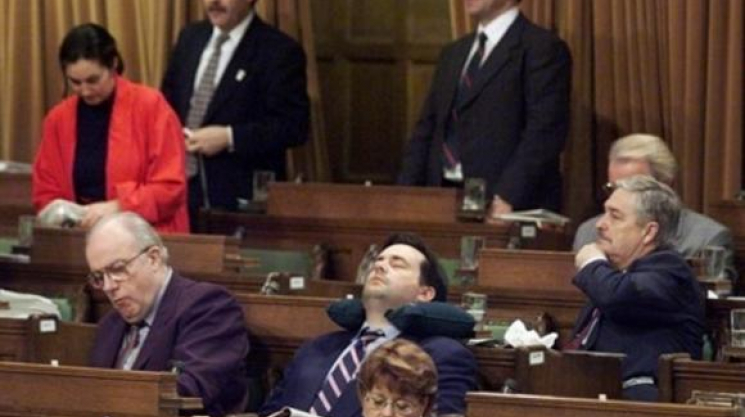
Tue, 06/19/2012 - 15:51 by Douglas Haddow
Our new guests had arrived to join us on the patio. We were 48 hours removed from the marathon voting session in the lower chamber over the contentious bill C-38, that one that would implement the Conservative government’s latest budget. The Action Plan for Canada’s economy. A vision for the future. Probably not one guiding us to the world of science fiction imaginations, but apparently instead a map for a staid path we’ve been told is a tested route to success, though nobody seems to be able to agree whether it points forward or backward.
We’d been forced to move tables as our numbers were doubling to four, and at the new spot, one of the young doctors who’d arrived to sit with us sarcastically marveled over the 23-hour voting marathon MPs had had to endure in order to make their way through the hundreds of proposed changes to the government’s bill – not one of which was accepted. In the opinion of our new table mate, so the fuck what? She worked 24-hour shifts every four days. So what if those poor MPs had to sit around for only 23?
I almost started arguing that she’d missed the point, but then I thought, hang on: what was the point? Or, at least, which part of the point were we supposed to care about the most?
The Point, if you listened to the days and days of narrative building by the opposition, was to Send A Message to the government. In there somewhere was a protest about changes to environmental legislation and old age security and employment insurance, they said again and again. And don’t think they didn’t try to do it another way, they told everyone at every chance. Oh, they tried! How they tried! Did they ever try! They tried to get the government to see it their way, to split the bill, and to just be reasonable. But to no avail, and so, they said, here we are for as long as it takes – for as long as necessary to make everyone see the alternative choice.
The Point, if you listened to the the days and days of narrative building by the government, was to Send A Message to the world. Canada, it wanted to make certain, is a country on a particularly amazing course. The bill didn’t need to be changed, they said, and how could it, when it was held so high as a document to avenge our souls and fight the demons of a global banking crisis and that looming, “unprecedented” labour shortage hiding under the bed like an evil Progress Dementor, ready to suck the life right out of our peaceful island of economic solitude. How could we ever change a righteous and glorious thing like that? How can one demand to alter excellence, to put a new curve in a perfect circle?
So there they were, the individuals we elected to the highest office in the land at their seats for an entire day, exercising their glutes. Up and down, up and down, compelled by whatever to register themselves in the final body count for all the Canadians out there. Or, at least, for all the ones they hoped would go to the polls next time around.
Sitting in the press gallery, it wasn’t a totally unfamiliar site. Only a year before, virtually the same group of MPs spent days telling each other ideological tales about the Canada Post work stoppage that had the nation’s mail on lockdown. This time, fewer words were exchanged, although there were some – usually petty exchanges about whether someone was drinking coffee or whether one party leader had been there as long as another. Bullshit, really. The kind of stuff you might not expect to come from this high home of democratic thinking, except, of course, that it happens all the time – even during the parts of the daily schedule where it shouldn’t. They just can’t help themselves.
Every day, for 15 minutes just prior to question period, MPs have the opportunity to read a members’ statement – a minute each, allotted to give members, should they choose, the chance to stand up and tell their colleagues and the nation about their community out there somewhere in the endless lost kilometers of this gigantic Canada. The statements don’t have to be about the back-home crowd, but when they are, they offer a weird spot of potential heart and humanity in a city filled to the brim so often with just about all of the opposite. And usually, early in the scheduled time, some nice stories are told. But then it all shifts as question period draws closer and more and more MPs come into the House of Commons, fresh from whatever kind of mental blowjob they got from the Party Mouths in the back. Maybe just a tease, a taste of ideological fallatio to get their motors running.
Very quickly – some days quicker than others, depending on how badly everyone’s ready to burst with the froth of Party Dogma – the tone of the statements changes, and everything turns to shit, and all the hoorays and well-dones for the constituents fly out the stained glass windows as party-selected members stand and read some rote ideological attack message their communications staff sent out in a press release an hour earlier. Like some awful solitary hostage, they bleat out the slop created by competing PR shops looking for the next nearest open spot to fill with hyperbolic ideological caulking – a sad soundproofing to the stories about the local community sports victory or blood drive, which themselves just become the buffer noise for the latest screaming, concentrated marketing message freshly blasted out the asshole of an advertising machine that does not give a fuck about your part of the country that you love and work hard to build, but gags for the one more minute it can hump full of another trumped up half-truth about the party across the aisle: that they’re all a bunch of fascists or socialists or idiots or bigots or something. An argument of the catchphrase and predictable zinger. Something, in other words, that is totally meaningless.
It’s enough for someone, perhaps, to have very little sympathy for those who are so willing to be the messengers of that kind of thing. Up and down in virtual silence for a full day? Maybe that was the point after all.
There is the idea somewhere that – to paraphrase – politics dies from the over-regulated play of its distinct opposites and because of this, the political sphere and the sphere of power generally is emptied and, in the end, represents nothing. Maybe. There certainly is an emptiness.





Add comment